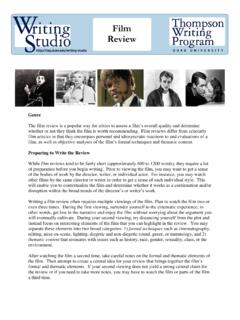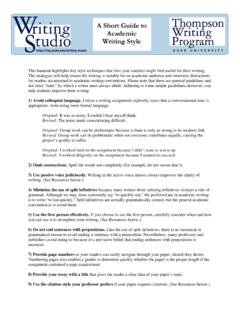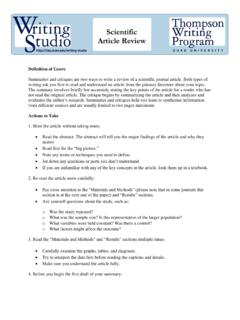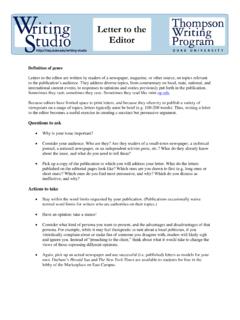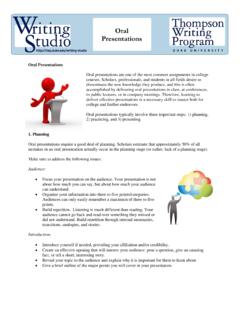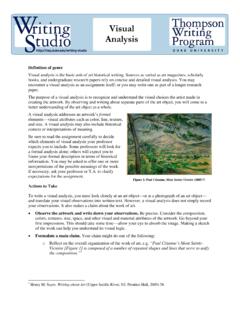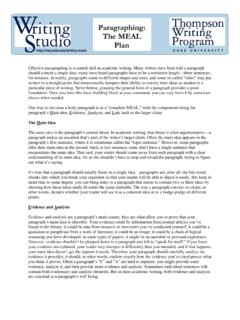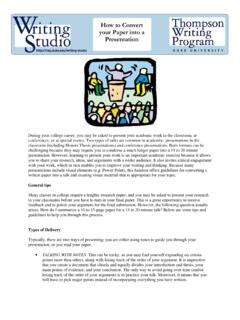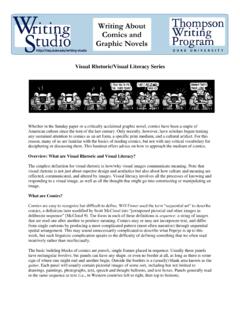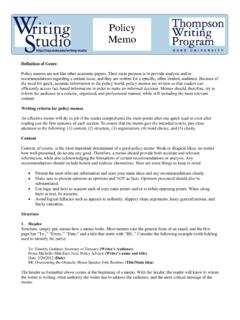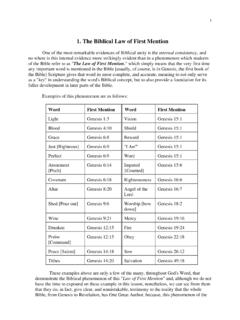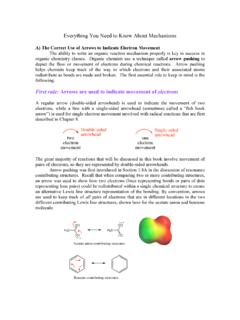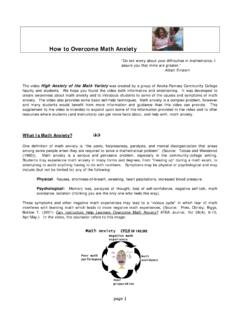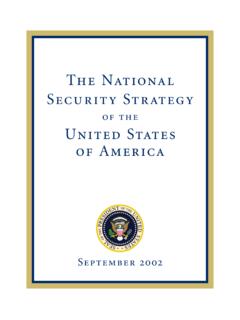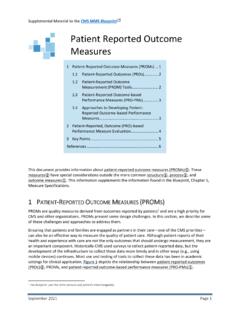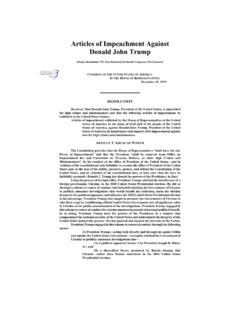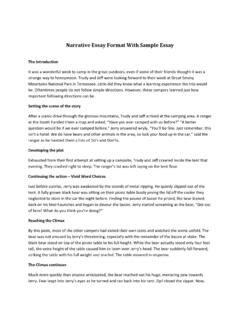Transcription of The First Person in Academic Writing - Duke University
1 The First Person in Academic Writing Because I Said So: Effective Use of the First - Person Perspective and the Personal Voice in Academic Writing Whether working within scientific disciplines, the social sciences, or the humanities, writers often struggle with how to infuse Academic material with a unique, personal voice. Many writers have been told by teachers not to use the First - Person perspective (indicated by words such as I, we, my, and our) when Writing Academic papers. However, in certain rhetorical situations, self-references can strengthen our argument and clarify our perspective. Depending on the genre and discipline of the Academic paper, there may be some common conventions for use of the First Person that the writer should observe. Developing a personal voice within an Academic paper involves much more than simply mentioning yourself. Writing in a personal voice can mean using language that comes naturally, allowing the writer to clearly express personal opinions or emotions on a subject.
2 One simple test for your work is to read it aloud and then ask yourself, Does this sound like something I would really say? Writing in an overly emotional style can detract from an argument s logical or ethical appeals. On the other hand, Writing that omits personal or emotional content often results in less compelling statements, and it may appear to straddle issues indecisively rather than staking a strong claim. As one Duke undergraduate observes, the lack of a personal voice can indicate a lack of ownership over ideas and arguments, which is crucial to successful Academic Writing (Knox 3). In most cases, the goal is to strike a balance between demonstrating a personal investment in a subject while maintaining a sense of objectivity and Academic rigor. In addition to observing conventions for First - Person references, writers should ask themselves, What is my personal investment in this piece of work?
3 The question of whether or not to mention oneself to I, or not to I should be considered within this larger context. Although they are not always necessary or advisable, writers should be aware that self-references and use of a personal voice can potentially strengthen an Academic argument, when used sparingly and selectively. A Brief History of the First Person For many years, the standard pedagogical position on using the First Person in English-language Academic Writing was simple: just say no. The logic behind avoiding the authorial I was that by eliminating self references, writers could supposedly address their subject more clearly and objectively. The proper rhetorical stance for an Academic writer, according to this traditional view, was dispassionate, impersonal, and (supposedly) unbiased. For example, in their classic Writing manual Elements of Style, First published in 1918, Strunk and White advised students to place yourself in the background, Writing in a way that draws the reader s attention to the sense and substance of the Writing , rather than to the mood and temper of the author (70).
4 By encouraging writers to eschew personal experiences or sentiments essentially editing the writer out of the Academic text teachers and professors often urge(d) their students to write in a way that ignores or denies the personal voice. In recent decades, scholars of rhetoric and composition have fostered a paradigm shift in pedagogical attitudes about the First Person . For example, James C. Raymond acknowledges that the suppression of Duke Writing Studio 2 the authorial I in Academic Writing , is, ultimately, a rhetorical [designed to create] the appearance of objectivity (482). Feminist scholar Gesa Kirsch goes even further, suggesting that omitting the authorial I is a rhetorical strategy that can be (and has been) used to turn opinions into truth, to silence women and other marginalized groups, and to trivialize their [T]he uses of an authorial I (or lack thereof) have social, moral, and political consequences for which authors bear responsibility (382).
5 For these scholars, the idea that omitting the personal renders an Academic paper objective is premised on the faulty notion any such objectivity exists. Identifying one s own ideological standpoint is therefore necessary in any ethical Writing practice. But My Professor Told Me Not Given these contemporary arguments for including the authorial I, why do so many teachers and scholars continue to discourage the First - Person perspective and the personal voice in Academic papers? o An excessive reliance on personal material and/or personal references can result in (or reflect) Academic work that focuses more on the writer than the subject at hand o An overemphasis on personal opinions may result from a lack of scholarly sources on which to base more empirical conclusions o An extensive focus on personal material may come across as narcissistic self-absorption or a lack of Academic rigor rather than an honest statement of one s investment in a particular subject For these and other reasons, the MLA Handbook for Writers of Research Papers specifically defines research papers as assignments that require us to go beyond our personal knowledge and experience (Gibaldi 3).
6 Even Gesa Kirsch, an outspoken proponent of the authorial I, acknowledges that unrestrained use of the First - Person perspective in Academic Writing can easily lead to self-indulgent, parochial, or confessional to Writing that forgets its subject (382). Therefore, when Academic writers employ the First Person and the personal voice, quantity does not necessarily correlate with quality: sometimes less is more. Extracting the First Person from the Personal Voice It is important to note that the First - Person perspective and the personal voice are not synonymous; the authorial I does not always signal a private or personal communication. Writers can project a strong personal voice without using the First Person , and they can write in the First Person without Writing personally. For example, scientists often refer to their conclusions by using I or we, but this does not necessarily mean they are speaking in a manner that conveys emotion, opinion, or a unique perspective.
7 Likewise, an anecdote that relates deeply meaningful or private information for example, a confidential story about one s family can be told without using I or we. Consider the following two statements: 1. The chief resident and I examined the patient, who has no health insurance, and we diagnosed her condition as ovarian cancer. 2. The patient is a single mother without health insurance, and she is deeply concerned about how to provide for her children. The First statement repeatedly employs the First Person (I and we), but its tone is dispassionate and clinically removed. The second statement does not invoke the First Person , but its tone is personal and Duke Writing Studio 3 empathetic. These examples demonstrate that the authorial I does not automatically indicate a private or privileged communication, and the personal voice does not always require the use of the First Person . As James Raymond has argued, not all authorial I s are equal (480).
8 Using the First Person in Scientific Writing As in the humanities, writers of scientific papers have traditionally avoided the First Person , but the First - Person perspective has grown more acceptable in recent years. Because experiments in physics, biology, engineering, and other sciences are often undertaken as collaborative efforts, the First - Person perspective in scientific papers is more likely to appear as we than I. This emphasis on collaborative investigations signified by the plural we may be adopted as a stylistic preference, even when the author actually conducted certain experiments alone. When scientists use First - Person pronouns, they tend to show up most often toward the end of the Introduction and in Results and Discussion sections; they are also increasingly common in Abstracts. Professor Cary Moskovitz, director of Duke s Writing in the Disciplines program, notes that scientists typically use First Person when discussing the intellectual aspects rather than the material: We hypothesized that the product would , but not We washed the pipettes.
9 For example, one Duke biologist explains in her journal article Summary that [i]n characterizing Aven protein, a previously reported apoptotic inhibitor, we have found that Aven can function as an ATM activator to inhibit G2/M progression (Guo 933). This plural First - Person reference (we have found) communicates the collaborative nature of the study and may even remind readers that scientific research is conducted by living, breathing people! Science writers are also more likely to employ the passive voice, removing First - Person references simply by excluding the actor altogether. Therefore, the comment We measured the thickness of the cell wall might also be stated as The cell wall was measured or merely Measurements were taken. The structure of these latter statements reflects a purportedly objective focus on the subject of inquiry rather than a focus on the investigator, as if to suggest that it is not important who took the measurements; what matters is the data that was recorded.
10 The writer of a scientific paper that reports the results of her study may also take it for granted the reader knows she and/or her coauthors conducted the experiments she is describing. However, even in such a case, a strict reliance on the passive voice can create ambiguities, if the more natural way to describe a specific action is to use the First Person . So When Do I Use I? Given the history of pedagogical advice to avoid the First Person in Academic Writing , and the valid reasons that support this traditional view, writers may wish to employ the authorial I sparingly. However, in certain rhetorical situations, stating one s case in the First Person may strengthen one s argument, rendering it more immediate, embodied, and compelling. It may be helpful to ask the following questions of your Writing : o Do my personal views on this subject significantly influence my approach to it? o Should I acknowledge my own personal investment in this topic?
